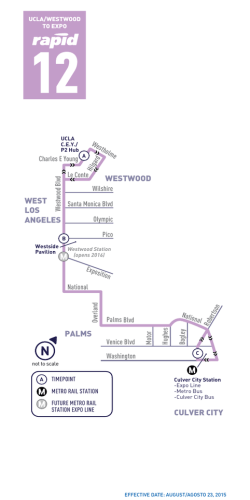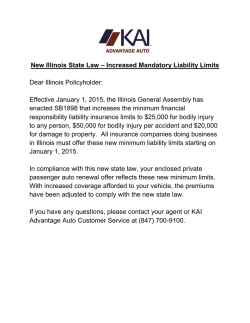
motion - CFPB Monitor
Case: 1:14-cv-03786 Document #: 61 Filed: 12/22/14 Page 1 of 12 PageID #:2156 IN THE UNITED STATES DISTRICT COURT FOR THE NORTHERN DISTRICT OF ILLINOIS EASTERN DIVISION PEOPLE OF THE STATE OF ILLINOIS, Plaintiff, v. ALTA COLLEGES, INC., et al., Defendants. ) ) ) ) ) ) ) ) ) Hon. Ronald A. Guzman Mag. Judge Geraldine Soat Brown Case No. 14-CV-3786 DEFENDANTS’ MEMORANDUM IN SUPPORT OF THEIR MOTION FOR SUMMARY JUDGMENT Defendants Alta Colleges, Inc., Westwood College, Inc., d/b/a Westwood College and Westwood College Online, Wesgray Corporation, d/b/a Westwood College-River Oaks and Westwood College-Chicago Loop, Elbert, Inc., d/b/a Westwood College-DuPage, and El Nell, Inc., d/b/a Westwood College-O’Hare Airport (collectively, “Defendants” or “Westwood”), respectfully submit this memorandum of law in support of their motion for summary judgment. INTRODUCTION1 Just like hundreds of thousands other organizations, Westwood advertises its programs through Google’s AdWords pay-per-click advertising program. (SOF ¶¶ 10-12.) Despite this, Plaintiff, the Illinois Attorney General (“AG”) claims that Westwood’s internet advertising is fraudulent even though it does not claim that Westwood’s website contains any misrepresentations or is deceptive. (SOF ¶ 9.) The AG does not even claim that any individual has ever actually been deceived by Westwood’s internet advertising. (SOF ¶ 43.) Rather, the AG claims that Westwood’s “practice of bidding on” certain keywords – all of which are indisputably related to the criminal justice field (specifically, variations of the term “FBI” and “Illinois State Trooper”) – could mislead 1 The following facts are taken from Defendants’ Local 56.1 Statement of Material Facts in Support of their Motion for Summary Judgment and are cited herein as (“SOF ¶ __.”) Reference to the Second Amended Complaint (“SAC”) is cited herein as (“SAC ¶ ___.”) Case: 1:14-cv-03786 Document #: 61 Filed: 12/22/14 Page 2 of 12 PageID #:2157 or confuse Illinois consumers because a degree from Westwood allegedly does not provide the educational prerequisites for certain jobs relating to those keywords. (SAC ¶¶ 303-308.) These allegations are grounded on a fundamental misunderstanding of internet advertising, and every user’s experience with the internet. As the AG’s own expert concedes, nothing about the keywords used in Westwood’s marketing is misleading, confusing, or deceptive. (See e.g., SOF ¶¶ 25, 29-30.) Westwood simply uses AdWords to find people that may be interested in a criminal justice career. In fact, Westwood’s use of AdWords is so unexceptional that the AG’s claim is “tantamount to stating that internet search advertising as a whole is inherently deceptive.” (SOF Exhibit C, p. 1.) Further, Counts III and IV purport to state claims under the Consumer Financial Protection Act (“CFPA”), 12 U.S.C. §§ 5481, et seq. for conduct that occurred prior to the enactment of the statute. Because the CFPA is not retroactive, Defendants are entitled to summary judgment on Counts III and IV to the extent they seek remedies for conduct prior to the enactment of the CFPA. UNCONTESTED FACTS I. Defendants. Defendants operate Westwood College, which is an undergraduate institution that provides students with a career-focused education. (SOF ¶ 3.) Westwood College has four ground campuses in Illinois and also offers students the opportunity to study online through Westwood College Online. (Id.) Defendants’ Illinois campuses offer fourteen degrees, but the AG’s suit targets only the criminal justice program. (SOF ¶ 5.) As an “institution of higher education” under Title IV of the Higher Education Act (“HEA”), 20 U.S.C. §§ 1001, 1002(b), Westwood is subject to extensive federal and state oversight and must satisfy substantial monitoring, disclosure and reporting requirement to participate in the Title IV federal financial aid programs. (SOF ¶ 7.) In addition, Westwood is extensively regulated by the U.S. Department of Education (“USDOE”), the Illinois Board of Higher Education (“IBHE”) and 2 Case: 1:14-cv-03786 Document #: 61 Filed: 12/22/14 Page 3 of 12 PageID #:2158 its accrediting body, the Accrediting Council for Independent Colleges and Schools (“ACICS”). (Id.) These regulations include rules on all aspects of Westwood’s operations, including marketing of the school and its financial aid program. (Id.) Defendants have never been found to be out of compliance by the USDOE, IBHE or ACICS with respect to any of the areas alleged by the AG in the SAC. (Id.) II. Defendants’ Internet Marketing. Westwood, like nearly every other institution of higher education (and practically every other business), advertises through various means, including the internet, to attract students. (SOF ¶ 8.) Westwood’s regulatory group reviews and approves all advertising and major recruitment materials before they are used. (Id.) Westwood and hundreds of thousands of other advertisers attempt to reach potential customers on the internet through Google’s AdWords pay-per-click advertising program.2 Through AdWords an advertiser may “bid” on “keywords” (which can be a word or a phrase), which increase the likelihood Google will display its advertisement when the keyword is used in a Google search.3 (SOF ¶ 11.)4 Advertisers also pay a certain amount for each “click” or person that visits their website from the search engine. (SOF ¶ 13.) Google (and other internet search engines) are remarkable systems. A user can type a single word or a short phrase and Google instantaneously returns information. Impressive as it is, as 2 In 2012 Google realized more than $43.5 billion – 96% of its total revenues – from pay per click advertising alone. (SOF ¶ 12.) 3 The frequency and priority of the advertiser’s link in Google’s search results is determined in part by the amount that the advertiser “bids” for the keywords. A bid is the amount the advertiser agrees to pay for each time a user clicks on its link (hence the term “pay-per-click” advertising). (SOF ¶ 13.) 4 Google also calculates a “Quality Score” based on how closely the advertiser’s webpage fits the designated keywords. The foundation of Google’s business model is to provide accurate internet searches; therefore, it prioritizes relevance over other factors – including advertiser keyword designations – in determining which ads to display and in what order. If the AdWords system determines that the ads relevance (Quality Score) is low, that will cause the advertisement to be shown at a lower frequency, at a lower position, or not at all on the results page. (SOF ¶¶ 16-17.) 3 Case: 1:14-cv-03786 Document #: 61 Filed: 12/22/14 Page 4 of 12 PageID #:2159 anyone who has ever “Googled” anything knows the process is far from perfect. Google results are often imprecise, if not seemingly unrelated to what the user is looking for. But as frustrating as that can be, it is hard to blame Google. Determining a user’s intent from a few search terms is an innately inexact endeavor. Users do not always choose their search terms particularly carefully and, even if they do, terms may be ambiguous or involve nuance that may be difficult or impossible to perceive from the few words the searcher enters. (SOF ¶¶ 31-32.) For an advertiser, this imprecision can be problematic. An advertiser wants to reach as many potentially interested customers as possible, but casting its AdWords net too broadly will result in uninterested consumers clicking on ads thereby increasing costs without additional sales. (SOF ¶ 18.) Google and its advertisers deal with this problem by balancing precision with breadth. Sometimes it will be easy to designate AdWords keywords that are likely to be relevant to a user’s search. For example, a Tesla car dealer would likely bid on the keyword “electric car.” But such a narrow focus would undoubtedly miss many potential customers. The Tesla dealer would also want to reach consumers searching for “efficient cars” or “green cars.” It likely would even want to reach consumers searching for “hybrid” cars – even though Teslas are not hybrids at all – in case (a) potential customers did not realize that Tesla engines are entirely electric, not hybrid electric/combustion, or (b) a consumer looking for a hybrid car might be convinced to buy an electric car instead. (SOF ¶ 24.) Westwood’s Google AdWords campaign uses a variety of terms designed to reach consumers who might be interested in educational programs relating to criminal justice or law enforcement. For example, it includes keywords relating to “police,” “FBI,” “state troopers,” and “criminal justice.” (SOF ¶ 20.) In Count One of the SAC, the AG alleges that Westwood violated the Illinois Consumer Fraud Act (“ILCFA”) by “bid[ding] on internet search terms in a manner intended to mislead or confuse Illinois consumers concerning the type of employment available to Criminal Justice 4 Case: 1:14-cv-03786 Document #: 61 Filed: 12/22/14 Page 5 of 12 PageID #:2160 Program graduates.” (SAC ¶¶ 299-310.) Specifically, the AG claims that Westwood’s advertising campaign is fraudulent because it bid on key terms relating to “FBI” and “state trooper.” (Id.) Plaintiff claims this is fraudulent because “no Westwood graduate in Illinois has ever been employed at the FBI after graduation” and “Westwood graduates cannot obtain employment as a State Trooper in Illinois.” (Id. at ¶¶ 306, 309.) Plaintiff’s own expert refuted these allegations in his deposition acknowledging that even if a college’s degree was not recognized by some police departments in Illinois, it would be “fair” for Westwood to bid on the phrase “Illinois State Police” “because some people might be interested in working for a police department within the State of Illinois that accepts a nationally accredited degree.” (SOF ¶¶ 25-26.) Likewise, Plaintiff’s expert recognized that because Westwood’s degree provides the prerequisites to become a FBI Special Agent, then it is “perfectly valid” and “fair” for Westwood to bid on terms relating to the FBI. (SOF ¶ 29.) In sum, Plaintiff’s own expert “I see nothing deceptive” about the specific advertisements Westwood used. (SOF ¶ 30.) As detailed herein, the AG’s allegations concerning Defendants’ internet marketing are fatally flawed and those flaws, both individually and collectively, make clear there is neither a legal or factual support for the allegations. Accordingly, Defendants are entitled to summary judgment on that aspect of the AG’s claims. III. The AG’s CFPA Claims (Counts III and IV). Counts III and IV purport to state claims under the Consumer Financial Protection Act (“CFPA”), 12 U.S.C. §§ 5481, et seq. The CFPA became effective July 21, 2011, and is not retroactive. Nevertheless, the allegations of Counts III and IV of the AG’s SAC are not limited to the timeframe of July 21, 2011 to the present. Nor are the remedies that the AG seeks for Count III and IV limited to the effective period of the CFPA. Prayer for Relief J asks the Court to “Order[] rescission of all APEX contracts with Illinois Criminal Justice students under the Consumer Financial Protection Act of 2010;” and Prayer for Relief K asks the Court to “Order[] disgorgement 5 Case: 1:14-cv-03786 Document #: 61 Filed: 12/22/14 Page 6 of 12 PageID #:2161 against Defendants under the Consumer Financial Protection Act of 2010.” (SOF, ¶ 49.) Thus, Defendants are entitled to summary judgment on Counts III and IV to the extent they seek remedies for conduct prior to the enactment of the CFPA. ARGUMENT I. Legal Standard Summary judgment is appropriate when the record shows that there is “no genuine issue as to any material fact and that the moving party is entitled to judgment as a matter of law.” Fed. R. Civ. P. 56(c). “[T]he plain language of Rule 56(c) mandates the entry of summary judgment, after adequate time for discovery and upon motion, against a party who fails to make a showing sufficient to establish the existence of an element essential to that party’s case, and on which that party will bear the burden of proof at trial.” Celotex Corp. v. Catrett, 477 U.S. 317, 322 (1986). Rule 56 does not require the moving party to negate the elements of the non-moving party’s case; to the contrary, “regardless of whether the moving party accompanies it summary judgment motion with affidavits, the motion may, and should, be granted so long as whatever is before the district court demonstrates that the entry for summary judgment, as set forth in Rule 56(c) is satisfied.” Id. at 323. While considering a motion for summary judgment, the court must view the evidence in the light most favorable to the non-moving party. Id. However, in contesting a motion for summary judgment, the nonmoving party may not rest on the pleadings alone; it must instead identify specific facts that raise more than a mere scintilla of evidence to show that a genuine issue of material fact exists. Heft v. Moore, 351 F.3d 278, 283 (7th Cir. 2003); Vukadinovich v. Bd. of Sch. Trs. of N. Newton Sch., 278 F.3d 693, 699 (7th Cir. 2002). To defeat summary judgment, the nonmoving party cannot simply “replace conclusory allegations of the complaint or answer with conclusory allegations of an affidavit.” Lujan v. Nat'l Wildlife Fed'n, 497 U.S. 871, 888 (1990) (unsupported affidavits not sufficient to withstand summary judgment) (citing Anderson v. Liberty Lobby, Inc., 477 U.S. 242, 249 (1986) (“the plaintiff could not rest on his allegations of a conspiracy to get to a 6 Case: 1:14-cv-03786 Document #: 61 Filed: 12/22/14 Page 7 of 12 PageID #:2162 jury without ‘any significant probative evidence tending to support the complaint’”)). A mere scintilla of evidence is not sufficient to oppose a motion for summary judgment. Id. Instead, the evidence must be such that a reasonable jury could return a verdict for the non-moving party. Id. II. Westwood’s AdWords Advertising Does Not Violate the Illinois Consumer Fraud Act. To prevail on its claim under the Illinois Consumer Fraud Act (“ILCFA”), the AG must establish: “(1) a deceptive act or practice by the defendant; and (2) the defendant’s intent that the plaintiff rely on the deception.” Robinson v. Toyota Motor Credit Corp., 775 N.E.2d 951, 960 (Ill. 2002). In addition, the unfair or deceptive act or practice must relate to a “material fact.” 815 ILCS 505/2. The AG has failed to establish that any genuine issue of material fact exists as to any of these issues. A. Westwood has not engaged in any unfair act or practice. Advertising is deceptive under the ILCFA if it “creates the likelihood of confusion or misunderstanding.” Aliano v. Ferriss, 988 N.E.2d 168 (Ill. Ct. App. 2013); see also Bober v. Glaxo Wellcome PLC, 246 F.3d 934, 938 (7th Cir.2001). The AG’s claim is novel. She does not contend that Westwood’s internet landing pages (i.e., webpages) are deceptive, misleading, or confusing.5 Rather, the AG contends that the mere appearance of advertisements in response to Google searches involving terms related to the “FBI” or “Illinois State Trooper” constitutes a deceptive representation that a Westwood degree satisfies the educational requirements for those specific jobs, and therefore may confuse or mislead Illinois consumers. The foundational premise of the AG’s theory is fundamentally misguided. No reasonable user believes that the display of a website advertisement in response to a Google search guarantees its relevance, let alone constitutes a representation that the advertiser’s product will satisfy the 5 Such clarifications are properly considered in determining whether advertising is misleading or confusing. See Lionel Trains, Inc. v. Albano, 831 F. Supp. 647, 651 (N.D. Ill. 1993), aff'd, 35 F.3d 568 (7th Cir. 1994) (summary judgment to defendant because any misleading aspect of its ads, which stated that its model trains were “limited production” or “limited edition,” was negated by defendant’s catalog’s statement that “[p]roducts depicted in this catalog may change in … availability after publication”). 7 Case: 1:14-cv-03786 Document #: 61 Filed: 12/22/14 Page 8 of 12 PageID #:2163 searcher’s needs. If such a nexus were the touchstone for the lawfulness of an advertisement then almost every Google search would provide the basis for a lawsuit against advertisers whose products did not “properly” address what the user was searching for. A much more accurate and universally understood characterization of the information conveyed by the appearance of an ad is something along the lines of “This website may have information that is relevant to your query.” (SOF ¶ 32.) (“[T]he goal is to provide relevant results and related information…. [T]he users decide what they deem to be important and what they deem to be not important.”). Google search results are intended to provide information that may help a consumer reach a decision; they are not a wholesale substitute for the user’s judgment.6 As the AG admits, internet advertising can only be deceptive when the content of the landing page is deceptive. (SOF ¶ 39.) The AG has not alleged that Westwood’s website contains false, misleading or deceptive information. (SOF ¶ 40.) To the contrary, Westwood’s website contains accurate and truthful information that is relevant to individuals searching for information about all types of criminal justice programs and careers, including information about what it takes to become an FBI agent or police officer in Illinois. (SOF ¶ 41.) In fact, Westwood’s Criminal Justice program satisfies the educational requirements to become an FBI Agent (SOF ¶ 28), and, as the AG’s own expect acknowledged, Westwood’s use of FBI-related keywords was therefore “perfectly valid” and “fair.” (SOF ¶ 29.)7 Similarly, the AG’s expert testified it was reasonable for Westwood to post ads responsive to “Illinois State Trooper” queries because one interested in becoming a trooper might be interested in other jobs in law enforcement or criminal justice position. 6 An overarching infirmity to the AG’s theory resulted from the fact that the author of the relevant allegations admitted in deposition that, inter alia, he has only a “vague understanding of what keywords are,” and does not understand many of the most basic aspects of internet marketing, including what pay-per-click searches are, and, how Google determines what ads are displayed in response to a search. (SOF ¶ 22.) 7 Google’s “keyword planner” is a widely used tool which helps advertisers select relevant keywords. (SOF, Exhibit D, 132:7-133:16.) Many of the FBI-related keywords used by Westwood are suggested by keyword planner. (SOF ¶¶ 35-36.) The AG’s internet marketing expert testified that using these keywords is a standard, fair, and non-deceptive practice. (SOF ¶¶ 23, 25, 29, 35.) 8 Case: 1:14-cv-03786 Document #: 61 Filed: 12/22/14 Page 9 of 12 PageID #:2164 (SOF ¶ 25.)8 Finally, perhaps the best evidence of the absence of any likelihood of any confusion or deception is the simple fact that no-one has ever complained about Westwood’s internet advertising. (SOF ¶ 43.) Indeed, the SAC contains no allegations that any consumer ever complained of being confused by Westwood’s internet marketing. B. Any confusion or deception would not relate to a material fact. To sustain her ILCFA claim the AG must also establish that the unfair or deceptive act relates to a “material fact.” 815 ILCS 505/2. A fact is material if “a buyer would have acted differently knowing the information, or if it concerned the type of information upon which a buyer would be expected to rely in making a decision whether to purchase.” Connick v. Suzuki Motor Co., 675 N.E.2d 584, 595 (Ill. 1996). Materiality must be “defined in the context of the transaction between the parties.” Lidecker v. Kendall Coll., 550 N.E.2d 1121, 1125 (Ill. Ct. App. 1990). As discussed above, no-one would expect a consumer to base his or her decision regarding whether to enroll in a college – at a cost of more than $66,000 and four years of study – on the mere fact that a website advertisement appeared in response to his or her Google search. There is no of evidence that any consumer ever considered the appearance of a Westwood internet advertisement in response to a Google search to be a material factor in deciding whether to enroll. The materiality requirement has not been met. 8 The AG’s internet marketing expert further agreed that “the job of the internet [is] to return answers to the exact query and other things that [the user] might be interested in as well.” (SOF ¶ 33.) For example, someone performing a Google search for “become a federal agent” “might be interested in criminal justice generally.” (SOF ¶ 33; Exhibit D, 61:11-17). Similarly, the former Assistant Attorney General who drafted the allegations relating to Westwood’s internet advertising agreed that even if a college’s degree was not recognized by some police departments in Illinois, it would be “fair” for an advertiser to bid on the keyword phrase “Illinois State Police” “because some people might be interested in working for a police department within the State of Illinois that accepts a nationally accredited degree.” (SOF ¶ 26.) 9 Case: 1:14-cv-03786 Document #: 61 Filed: 12/22/14 Page 10 of 12 PageID #:2165 C. There is no proof Westwood intended for any student to enroll based on their reliance on an advertisement being displayed in response to their Google search. Finally, to survive summary judgment the AG must also establish that there is a genuine issue of material fact regarding whether Westwood intended that consumers “rely on the deception.” Robinson v. Toyota Motor Credit Corp., 775 N.E.2d 951, 960 (Ill. 2002). Here, reliance would involve a customer’s commitment to spend more than $66,000 and four years of study pursuing a degree that would not meet their needs because a Westwood advertisement was shown as part of the results of the consumer’s Google search. It is not surprising that the record is devoid of evidence supporting this element. Westwood used AdWords in just the same way that other advertisers do: as an unquestionably accepted method for bringing their product to the attention of prospective customers. (SOF ¶¶10-12.) If Westwood’s AdWords campaign is unlawful, then so are tens of thousands (or hundreds of thousands) of others. (Id.) Any implication of intent is further refuted by Westwood’s extensive pre-enrollment process and explicit disclosures, which would eliminate any possible confusion. The Appellate Court of Illinois has found a lack of intent under the ILCFA even where a nursing school did not inform its students that it was not accredited at all. See Lidecker, 550 N.E.2d at 1124. Westwood’s pre-enrollment disclosures certainly negate any implication of intent. For all of these reasons, the Court should grant summary judgment on the AG’s claims contained in Count One to the extent they rely on internet marketing allegations.9 9 Defendants are well aware that Courts are reluctant to entertain partial summary judgment motions and so Defendants do not make this motion lightly. But in this case, granting this motion as to the internet marketing allegations would relieve both sides of the need to call their expert witnesses on these issues. That result is particularly reasonable here, given that both experts agree that Westwood’s internet marketing ads were not deceptive. (SOF ¶ 23.) 10 Case: 1:14-cv-03786 Document #: 61 Filed: 12/22/14 Page 11 of 12 PageID #:2166 III. The Court Should Grant Summary Judgment on Counts III and IV to the Extent they Purport to Hold Defendants Liable For Conduct Prior to July 21, 2011. The Court should enter partial summary judgment on Counts III and IV barring the AG from seeking remedies for alleged conduct prior to July 21, 2011, because the CFPA does not cover conduct that occurred prior to that date.10 See Fredricksen v. United Parcel Serv., Co., 581 F.3d 516, 521 n.1 (7th Cir. 2009) (affirming summary judgment for defendant because “Congress did not express its intent for [the Amendments] to apply retroactively, and so we look to the law in place prior to the amendments.”). Here, there was no version of the CFPA in place prior to July 21, 2011. The AG does not dispute that the CFPA became effective July 21, 2011, and the Dodd-Frank Act is not retroactive. See Mart v. Gozdecki, Del Giudice, Americus & Farkas LLP, 910 F. Supp. 2d 1085, 1095 (N.D. Ill. 2012) (“Dodd–Frank does not have retroactive effect.”); Molosky v. Washington Mut., Inc., 664 F.3d 109, 113, n.1 (6th Cir. 2011) (“These provisions came into effect on July 21, 2011, and have no retroactive effect with regard to the issues in this appeal. There is no explicit statement from Congress that they are meant to be retroactive, suggesting no retroactivity.”); (see also SOF, ¶ 46.) Yet while the AG admits that she cannot seek remedies for conduct occurring prior to the effective date of the statute, her SAC tells a different story. For example, Count III alleges, “[f]rom 2004 through the present, Defendants have induced Illinois Criminal Justice students to sign Defendants’ institutional financing contracts through a variety of unfair acts and practices designed to interfere with the consumers’ ability to make informed choices.” SAC ¶¶ 477. The remedies that the AG seeks for Count III and IV likewise are not limited to the effective period of the CFPA. Prayer for Relief J asks the Court to “Order[] rescission of all APEX contracts with Illinois Criminal Justice students under the Consumer Financial Protection Act of 2010;” and Prayer for Relief K asks the Court to “Order[] disgorgement against Defendants under the 10 The AG appears to recognize this limitation as to Count IV (see ¶ 488), but not as to Count III (see ¶ 477). 11 Case: 1:14-cv-03786 Document #: 61 Filed: 12/22/14 Page 12 of 12 PageID #:2167 Consumer Financial Protection Act of 2010.” But since that relief would necessarily include APEX contracts entered into from 2004 through July 20, 2011 (i.e., the day before the statute became effective), and any moneys collected during that period, Prayers for Relief J and K seek remedies that plainly are not available under the CFPA. The Court should enter partial summary judgment on these remedies to the extent they seek to punish Defendants for conduct that occurred before the CFPA was effective. See Steffen v. Donahoe, 680 F.3d 738, 745 (7th Cir. 2012) (affirming summary judgment for defendants because a non-retroactive statute does not apply to “the allegedly violative actions [that] transpired before the effective date”). CONCLUSION For the forgoing reasons, the Court should grant summary judgment on Count I to the extent it is predicated on the AG’s internet marketing allegations and on Counts III and IV to the extent they purport to seek remedies for conduct prior to July 21, 2011. Dated: December 22, 2014 Joseph J. Duffy William P. Ziegelmueller Mariah E. Moran Henry M. Baskerville STETLER, DUFFY & ROTERT, LTD. 10 South LaSalle Street, Suite 2800 Chicago, Illinois 60603 Phone: 312-338-0200 Fax: 312-338-0070 Attorney No. 35853 Respectfully submitted, ALTA COLLEGES, INC.; WESTWOOD COLLEGE, INC.; WESGRAY CORPORATION; ELBERT, INC.; and EL NELL, INC. By: /s/ Mariah E. Moran One of Their Attorneys 12
© Copyright 2026





